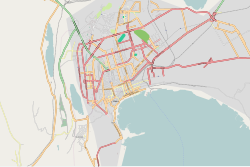
Martyrs' Lane or Alley of Martyrs, formerly known as the Kirov Park, is a cemetery and memorial in Baku, Azerbaijan dedicated to those killed by the Soviet Army during Black January 1990 and in the First Nagorno-Karabakh War of 1988–1994.

Holy Myrrhbearers Cathedral a local historical monument and church, built in 1909 in Baku, serves as the center of the Baku diocese.
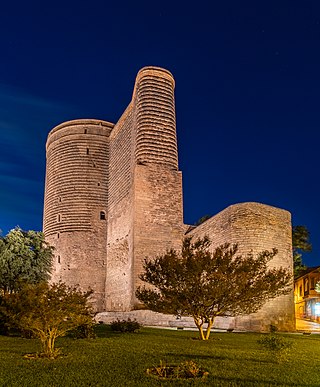
The architecture of Baku is not characterized by any particular architectural style, having accumulated its buildings over a long period of time.

The Bibi-Heybat Mosque is a mosque, located in Baku, Azerbaijan. The existing structure, built in the 1990s, is a recreation of the mosque with the same name built in the 13th century by Shirvanshah Farrukhzad II Ibn Ahsitan II, which was completely destroyed by the Bolsheviks in 1934.

The Yukhari Govhar Agha Mosque, also called the Great Mosque of Govhar Agha, is a Shia Islam mosque located in the city of Shusha, Azerbaijan.

Church of Michael the Archangel or Flotskaya is a Russian Orthodox church located at the intersection of Vidadi and Zargarpalan streets in the Yasamal district, central Baku, Azerbaijan. It is under the jurisdiction of the Baku Eparchy and dedicated to Archangel Michael. The church's protoiereus is Mefodi Afendiyev, and it is served by three priests and one deacon. It is recognized as the oldest surviving church in Baku.

The Juma Mosque, also known as the Friday Mosque, is a Shia Islam mosque, located in Baku, Azerbaijan.
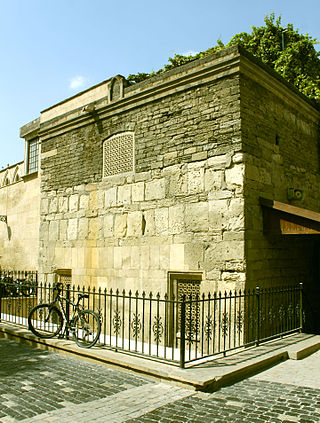
The Ashur Mosque, also known as the Lezgi Mosque, is a Sunni Islam mosque in the Old City of Baku, Azerbaijan. It was founded in 1169 by the master Najaf Ashur son of Ibrahim. It is located in Asaf Zeynalli Street. The mosque was closed for repairs in 2016 and as of December 2024, the mosque remains closed.

The Tuba-Shahi Mosque is a former mosque and historical architectural monument, located in the Mardakan village of the Khazar district in Baku, Azerbaijan. Completed in c. 1482, the former mosque is included in the list of the historical and architectural monuments of local importance approved by the Cabinet of Ministers of the Republic of Azerbaijan.

Nizami Street is a large pedestrian and shopping street in downtown Baku, Azerbaijan, named after classical Persian poet Nizami Ganjavi.

Imamzadeh Mausoleum or Goy Imam Mosque is located 7 km northward to Ganja. It consists of a complex including walls with entrances, small mosques and funerary monuments. The mausoleum, located inside the mosque, bears the grave of Imamzadeh Ibrahim, son of Imam Muhammad al-Baqir, the fifth Imam of Shi'a Muslims.
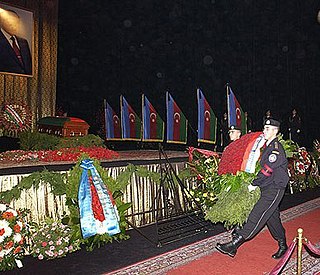
Heydar Aliyev, the former President of Azerbaijan, died on 12 December 2003 in the Cleveland Clinic at 10 am local time from heart failure at the age of 80. On 14 December, his coffin was taken to Baku.

Sovetsky is a historic district in Mirzaagha Aliyev Street, Baku, Azerbaijan. It is located in Yasamal raion, between Nariman Narimanov Avenue and Mirza Ibrahimov Street, and between Nizami and Ibrahim Abilov streets. There are many historical buildings over a century old, museums, mosques, baths and houses of notable Azerbaijanis.

The Heydar Mosque is a mosque, located in the Binəqədi raion of Baku, in Azerbaijan. Opened on 26 December 2014, the mosque is named after Heydar Aliyev, a former President of Azerbaijan. It is the largest mosque in Azerbaijan and the Caucuses.

The Beyler Mosque is a former Shia Islam mosque and historic architectural monument which is located in the Old City of Baku, opposite the “Murad” Gate of the Shirvanshah Palace Complex, in Azerbaijan.

The Imam Hussein Mosque, also known as the Ashumov Mosque, is a mosque and historical architectural monument, located in the city of Baku, the capital of Azerbaijan.
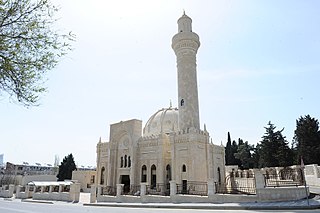
The Haji Javad Mosque is a mosque located in the in Yasamal District of Baku, the capital of Azerbaijan.

8 November is a station on the third (purple) line of the Baku Metro. The station was named to commemorate Victory Day of Azerbaijan.
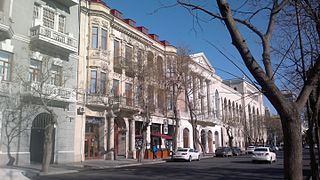
Khagani Alley is a road from Rasul Rza alley to Kovkab Khanim Safaraliyeva alley. There are many historical monuments of the 16th to 20th centuries on the street, as well as a statue and three parks. The road is 1.7 kilometres (1.1 mi) in length.
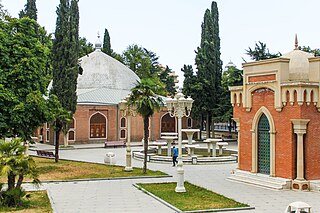
Shah Abbas Square is a square located in the historical center of the city of Ganja, Azerbaijan. At one time, it was the main memorial complex of the suburb of the Ganja fortress. The complex of Shah Abbas Square was firstly mentioned in the plan of the Ganja fortress of 1797. This architectural ensemble, located in the center of the suburb, consisted of a mosque, a bathhouse and other buildings.

